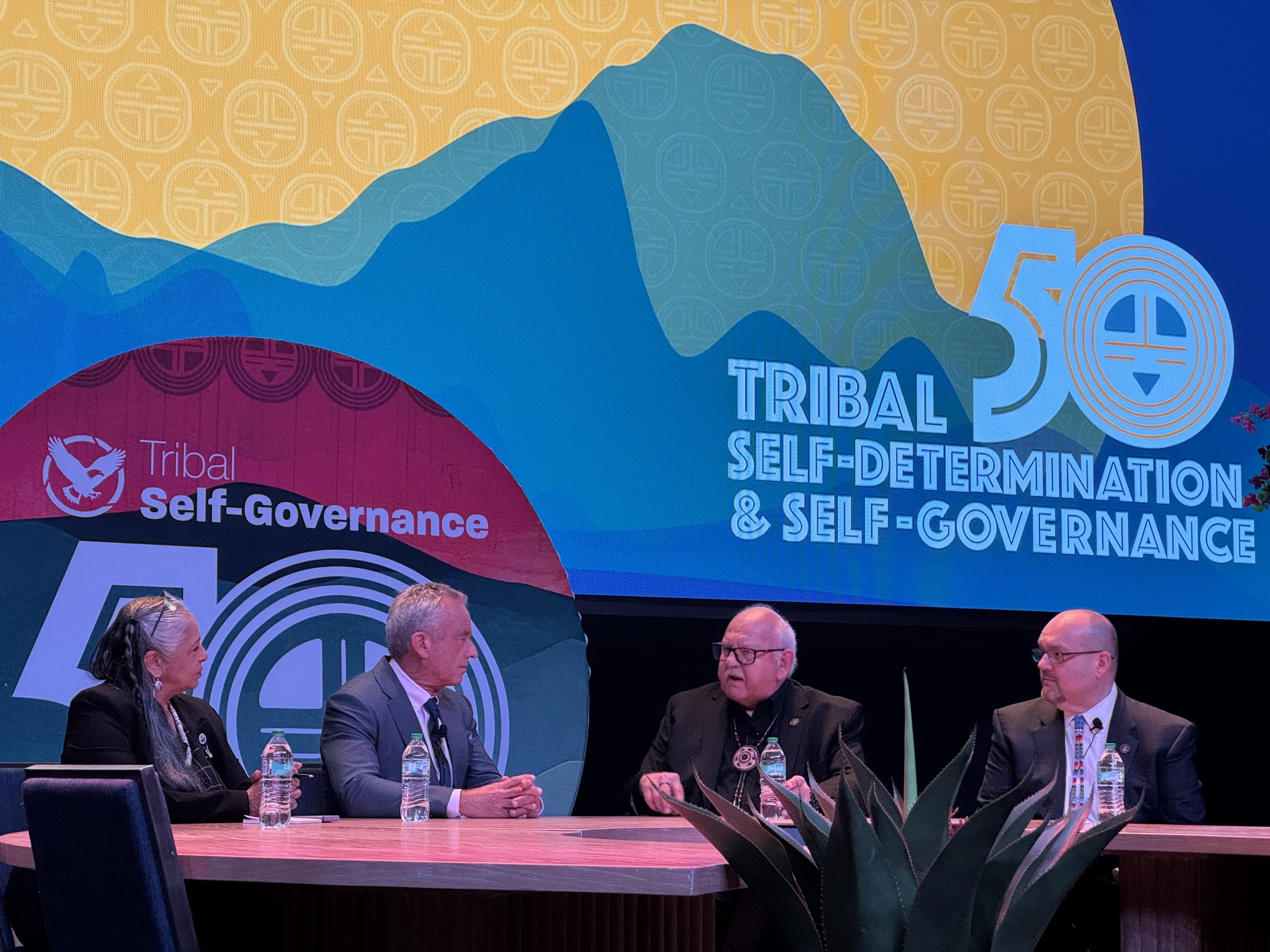
- Details
- By Levi Rickert
Tribal leaders from the Health and Human Services (HHS) Secretary’s Tribal Advisory Committee (STAC) joined HHS Secretary Robert F. Kennedy Jr. in a fireside chat during the Tribal Self-Governance Conference on Tuesday, held on the Gila River Indian Community reservation near Phoenix.
The fireside chat was part of Kennedy’s “Make America Healthy Again” (MAHA) tour through the American Southwest.
On stage with Secretary Kennedy were Chairman W. Ron Allen of the Jamestown S'Klallam Tribe; Chairwoman Cheryl Andrews-Maltais of the Wampanoag Tribe of Gay Head (Aquinnah); and Lieutenant Governor Chris Anoatubby of the Chickasaw Nation.
Early in the nearly hour-long conversation, Kennedy spoke about the Kennedy family's long-standing commitment to Indian Country. He noted that his father, the late Sen. Robert F. Kennedy (D-NY), was dedicated to improving the lives of Native Americans—a commitment he said he shares. He told the audience that on the night his father was assassinated in June 1968, Sen. Kennedy was late delivering his victory speech in Los Angeles—after winning the California primary—because he had been on the phone with tribal leaders from South Dakota, where he also won the primary that same day.
A Continuation of Ongoing Dialogue
Native News Online spoke with Allen and Andrews-Maltais following the fireside chat. Both said Tuesday’s event continued the positive dialogue that began during Kennedy’s meeting with STAC members in Washington shortly after his Senate confirmation in February.
Allen described the conversation as constructive, noting he reminded Kennedy that the Indian Health Service (IHS) remains underfunded and understaffed, and that tribes depend heavily on additional federal grants and programs.
“We told him why self-governance works and how self-governance works,” Allen said. “We discussed the importance of third-party revenue from Medicare, Medicaid, CHIP, and veterans' programs. These are essential for making our clinics and hospitals successful. And we emphasized that it's not just about primary care or specialty care—it’s also the other programs that have a significant impact on our work.”
Chairwoman Andrews-Maltais said she attended the fireside chat with cautious optimism, recalling Kennedy’s attentiveness and engagement during the February STAC meeting.
“Not only did he get Indian Country—he understood the difference between tribal sovereignty and DEI. He recognized that we have political standing and status that comes from treaty and trust responsibilities,” she told Native News Online. “So, we really didn’t have to go through ‘Indians 101’ with him or his staff—they already knew it, which was very encouraging.”
During the fireside conversation, tribal leaders stressed to Kennedy that much of Indian Country is located in rural areas. In some cases, they noted, IHS facilities are absent, and HHS clinics are the primary providers of care for Native Americans.
A Commitment to Indian Country
Even before his confirmation, Kennedy had met with tribal leaders and committed to establishing a position similar to an assistant secretary focused on Indian Country. He reaffirmed that commitment during the fireside chat.
In addition to the Phoenix-area event, Kennedy visited Utah, Arizona, and New Mexico on Monday, Tuesday, and Wednesday to observe firsthand how local and tribal leaders are advancing the MAHA agenda.
“At every stop on this tour, I witnessed the impact of bold leadership — from state lawmakers to Indigenous leaders standing up for the health of their communities and the future of their children,” Kennedy said. “At HHS, we’re committed to empowering these communities by supporting science-based policies, rebuilding trust in public health, and protecting future generations from harmful exposures. That is how we’ll Make America Healthy Again.”
Following the fireside chat, Kennedy visited an Indian Health Service clinic in the Phoenix metropolitan area that provides a range of services, including medical, behavioral health, dental care, and WIC support.
More Stories Like This
New Mexico Will Investigate Forced Sterilization of Native American WomenUSDA Expands Aid for Lost Farming Revenue Due to 2025 Policies
Two Feathers Native American Family Services Wins 2026 Irvine Leadership Award
Bill Would Give Federal Marshals Authority to Help Tribes Find Missing Children
Indian Health Service to Phase Out Mercury-Containing Dental Amalgam by 2027


